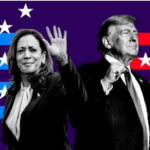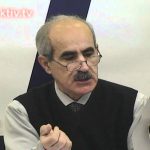Traditional opposition political forces in Azerbaijan are at risk of being eclipsed by Islamists who are willing to push back when the government resorts to repressive measures, Baku political observers say.
Mainstream, secular opposition parties, including the Popular Front Party of Azerbaijan (PFP) and the Musavat Party, are fragmented and have struggled
in recent years to find a way to influence political, social and economic developments in Azerbaijan. Party leaders cite government repression as the main reason for opposition ineffectiveness.
With mainstream parties seemingly stuck in a rut, Islamists have attracted widespread attention of late through the use of aggressive tactics. The confrontational approach was on full display October 5, when more than 200 observant Muslim men gathered in front of the Ministry of Education in Baku, renewing efforts to end an informal ban on women wearing hijab, a Muslim head covering for women, in Azerbaijan’s public schools and universities. As in the past, police acted forcefully to put an end to the unsanctioned demonstration. But this time, demonstrators fought back, beating law-enforcement officers with wooden clubs.
Twenty police officers, including Baku’s deputy police chief, Sehlab Baghirov, reportedly were injured during the clash, and three officers were hospitalized, according to the Baku City Prosecutor’s Office and police. Sixty-five people were arrested. Police later detained one man, Javid Mammadov, whom they claimed was the alleged organizer of the demonstration.
Protesters also went on the offensive during an October 17 rally in front of the US Embassy to denounce “The Innocence of Muslims,” a YouTube video widely condemned as offensive to the Prophet Mohammed. As police moved in to arrest chanting demonstrators, other protestors intervened to block them. Some 30 participants were detained.
For many Azerbaijanis — who are accustomed to seeing police beat demonstrators, rather than the other way around — the hijab rally was an unusual turn of events. Various social media commentators expressed sympathy for the believers for, as they put it, fighting for their rights.
Altay Goyushov, a professor of Islamic history at Baku State University, said the protestors’ willingness to fight back is a major reason why the Islamic opposition is getting more public attention these days, including from non-religious Azerbaijanis. “The democratic opposition uses peaceful ways to demand change and make the government responsible,” Goyushov said, referring to the PFP, Musavat and other secular-oriented opposition groups. “This does not bring any result and disappoints the public. On the other hand, here comes a new force, which refuses to [go along] peacefully with the authoritarian government. They offer radical ways to hold the government responsible.”
Researcher Arif Yunus, the author of two books on Islam in Azerbaijan, suggested that Islamists are currently doing a better job in communicating their message. And the use of aggressive tactics isn’t the only way Islamists are differentiating themselves from mainstream politicians, Yunus added. “First of all, unlike the democratic opposition, they prefer to gather around the institution which they claim to be guilty, or which they think should hear their messages,” Yunus said. “On top of that, they send specific messages that clearly demonstrate why exactly they gathered at that place.”
Ali Kerimli, the PFP head, maintains that violence will do little to advance opposition ideals, whether religious or secular in nature. While acknowledging that non-violent tactics have not yet brought desired reforms, he insisted that embracing aggression would go against the political principles of his party. “We will continue our fight with the authoritarian government peacefully. This type of fight is hard; it takes time, it requires patience. But we cannot get success with violence,” he said.
Kerimli at the same time conceded that the Islamic demonstrators’ hard-nosed response to police crackdowns might hold attractions for many Azerbaijanis. “If, as a political power, we cannot achieve change because the current government is repressive, then the nation itself will look for other alternatives,” he noted. “This can lead them to see a radical, violent way of struggle as the only option.”
The government has itself to blame for stoking violent confrontations with believers, some religious leaders maintain. Recent moves aimed at restricting freedom of conscience, including the informal Hijab ban and mosque closures, have alienated and angered many otherwise mainstream believers. “All of these restrictions by the government are being used against it,” said Gamet Suleymanov, an imam from Azerbaijan’s conservative Salafi community. “Radical groups take advantage of this dissatisfaction … to mobilize people against the government.”
Some Islamic political activists maintain that, while they support the pro-hijab demonstration, they draw the line at fighting with police. A representative of the banned Islamic Party of Azerbaijan, which has several members in jail on charges of allegedly planning a terrorist attack to overthrow the government, told EurasiaNet.org that it condemns the demonstrators’ use of violence against police.
“But it is not [the protesters] who should be blamed for the violence,” asserted Haji Arif Heyderli, deputy head of the party’s political affairs department. “It is the government that does not leave any room for believers, except violence. “
The State Committee for Work with Religious Organizations maintains that such claims do not reflect reality. Azerbaijani society is tolerant toward religion, asserted spokesperson Orkhan Ali, and “the number of supporters of political Islam has declined sharply.”



